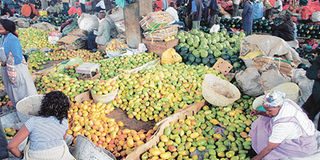Experts rap country’s food policies

Agriculture analysts say laws governing the important sector need to be overhauled to build food security. Photo / file
As the government grapples with the deepening food crisis, experts are questioning the policies that govern agriculture in the country.
They say while the government is keen to encourage agribusiness, the land tenure system, unclear market systems and land use have stifled growth.
“The problem of the country pertaining to food security rests solidly in the systems and modes of production we have adopted, encouraged and sustained,” said Cindano Gakuru, a lawyer specialising in agricultural law.
Food security and sovereignty, they say, should go beyond machinations of individual ministries and the National Cereals and Produce Board. Land tenure systems and land use, coupled with failure to maximise on crops with high returns, have confined the country to perpetual shortage, even in years when there is adequate rainfall.
Peter Kegode, an agribusiness expert said the government should speedily enact the land policy to open up locked up potential.
This, coupled with review of water use rights to encourage irrigation, will result in improved food production in a short time.
“The laws need massive overhaul to enable them function and be consistent with the changed times,” Mr Kegode said. The Cabinet recently agreed to review several laws governing agriculture, but Mr Kegode said the attorney general’s office lacked enough lawyers to draft the laws and have them speedily passed in Parliament.
Statistics from the Ministry of Agriculture’s Economic Review of Agriculture 2008, compiled by its Central Planning and Project Unit paint a grim picture of trends in food security.
For example, production of the three major staples in Kenyans’ food menu— maize, wheat and rice—shows that the country has had to import to cover a huge shortfall in recent years.
The problem, the experts say, is that the country remains saddled with outdated policies. For example, 80 per cent of the Kenya land mass is in arid and semi-arid areas (ASALs), which is not arable without irrigation.
The remainder, close to 7 per cent is land that is arable, but in recent years, the rainfall patterns have been erratic partly due to the effects of global warming and destruction of forests from human encroachment.
Agriculture experts say that this is where towns, rural urban centres, national parks and idle private and public land are found, further reducing the area under rain-fed agriculture. The underlying principle in agriculture policies has been commercialisation of agriculture, which they say, though important, should embrace food security as key to the drive.
“There is an urgent need to rethink agriculture in broader aspects such as food security and sovereignty. It makes little sense to advocate and champion for commercialisation of agriculture yet two-thirds of producer farms in the small scale holdings— the bulk of land base is not primed for crop production,” Mr Gakuru said.
Several laws governing food production as a public good like the NCPB Act Cap 338 give it mandate to purchase, store, sell, import and export and disposal of maize and wheat and other produce for any purpose.
The other is maintenance of a strategic national reserve, while the prices are determined by the minister for Agriculture. This, they say, is against the spirit of a liberalised market.




